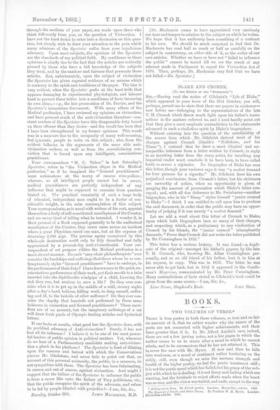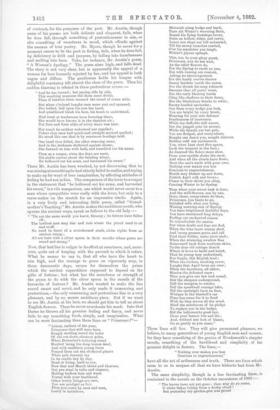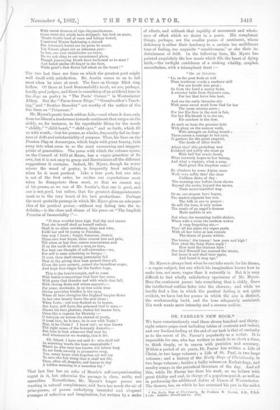BOOKS.
TWO VOLUMES OF VERSE.*
THERE is true poetry in both these volumes, so tine and so fair an amount of it. that we rather wonder why the names of the poets are not connected with higher achievements, and their fame greater than it is. In Mr. Alfred Austin's case, indeed, there are not a few jarring notes, not a few pages in which the author seems to us to strain after a mood to which he cannot attain, and to be unconscious that he has not attained it. This ia never the case with Mr. Myers. If now and then he falls into weakness, or a mood of sentiment rather bordering on the sickly, still, even though we miss the nervous strength and health of the higher poetry, we feel the poetic treatment still ; it is not the poetic mood which has failed, but his grasp of the sub- ject with which he is dealing; it is not fancy and feeling which am wanting, but the fortitude to reject efforts made when the heart was as wax, and the vision was turbid, and unfit, except in the way * Soliloquies in Song. By Alficd Austin. London : and 00. 1882. The Renewal if Youth, and Other Poems. By Frederic W. H. Myers. Loudon: MR0E111811 and Co. 1882. of contrast, for the purposes of the poet. Mr. Austin, though some of his poems are both delicate and eloquent, fails, when he does fail, through something of pretentiousness in aim, or else something of smartness in mood, which offends against the essence of true poetry. Mr. Myers, though he never for a moment ceases to be the poet in feeling, fails, when he does fail, by deficiency in drift and purpose, by falling into formlessness and melting into haze, Take, for instance, Mr. Austin's poem, "A Woman's Apology." The poem aims high, and falls dead. The story is not very clear, but is apparently the appeal of a woman for love formerly rejected by her, and her appeal is both vague and diffuse. The gentleman holds his tongue with delightful constancy till almost the close of the poem. Then his sudden thawing is related in these pretentious verses :-- " And he too turned; but pacing side by side This mocking nearness did them more divide,
Than if betwixt them moaned the round of ocean wide.
But when o'erhead boughs once more met and spanned, She halted, laid upon his arm her hand, And questioned blank his face, hie heart to understand.
Had trust or tenderness been hovering there, She would have known it in the duskiest air ; Bat face and form alike of every trace was bare.
Her touch he neither welcomed nor repelled ; Pulses that once had quickened straight seemed quelled ; He stood like ono that is by courteons bondage held.
One hand thus foiled, the other rescuing came, And in the darkness sheltered against shame, She fawned on him with both, and trembled out his name.
Then as a reaper, when the days are meet, His sickle curves about the bending wheat, He hollowed out his arms, and harvested his sweet."
There Mr. Austin has been wrecked, by not discovering that he was aiming at something he had utterly failed to realise, and trying to make up for want of true imagination, by affecting attitudes of feeling he had not in him. The comparison of the lover to a reaper in the statement that "he hollowed out his arms, and harvested his sweet," is a vile comparison, one which would never occur to a man whose sympathies were really with the lover, but only to a verse-maker on the stretch for an impressive simile. Again, in a very lively and interesting little poem, called "Grand- mother's Teaching," Mr. Austin makes the ambitious youth, who spurns the ancient ways, speak as follows to the old lady :—
"Tie not the same world you knew, Granny ; its fetters have fallen off ; The lowliest now may rise and rule where the proud used to sit and scoff.
No need to boast of a scutcheoned stock, claim rights from an ancient wrong ; All are born with a silver spoon in their mouths whose gums are sound and strong."
Now, that last line is vulgar in its effort at smartness, and, more- over, quite out of keeping with the proverb to which it refers. What be means to say is, that all who have the heart to aim high, and the courage to press on vigorously may, in these democratic days, secure for themselves the prizes which the ancient superstition supposed to depend on the gifts of fortune ; but what has the soundness or strength of the gums to do with the silver spoon in the mouth of the favourite of fortune P Mr. Austin wanted to make the line sound smart and novel, and he only made it unmeaning and pretentious,—the only unmeaning and pretentious line in a very pleasant, and by no means ambitious piece. But if we want to see Mr. Austin at his best, we should get him to tell us about English flowers. There he never overshoots his mark, Into that theme he throws all his genuine feeling and fancy, and never fails to say something fresh, simple, and imaginative. What can be more fascinating than these lines on "Primroses P"—
" Latest, earliest of the year,
Primroses that still were here, Snugly nestling round the boles Of the eat-down chestnut poles, When December's tottering tread Rustled 'along the deep leaves dead, And with confident young fnces Peeped from out the sheltered places When pale January lay In its cradle day by day, Dead or living, hard to say, Now that mid.March blows and blusters, Out you steal in tufts and clusters, Making leafless lane and wood Vernal with your hardihood.
Other lovely things are rare, You are prodigal as fair.
First you come by ones and ones, Lastly in battalions,
Skirmish along hedge and bank, Turn old Winter's wavering flank, Round his flying footsteps hover, Seize on hollow, ridge, and cover, Leave nor slope nor hill unharried, Till his snowy trenches carried, O'er his sepulchre you laugh, Winter's joyous epitaph.
This, too, be your glory great, Primroses, you do not wait, As the other flowers do, For the Spring to smile on you, But with coming are content, Asking no encouragement.
Ere the hardy crocus cleaves Sunny borders 'neath the eaves, Ere the thrush his song rehearse Sweeter than all poets' verse, Ere the early bleating lambs Cling like shadows to their dams, Ere the blackthorn breaks to white, Snowy-hooded anchorite ; Out from every hedge you look, You are bright by every brook, Weaving for your sole defence Fearlessness of innocence.
While the daffodils still waver, Ere the jonquil gets its savour, While the linnets yet but pair, You are fledged, and everywhere. Nought can daunt you, nought distress, Neither cold nor sunleasness.
You, when Lent sleet flies apace,
Look the tempest in the face ; As descend the flakes more slow, From your eyelids shake the snow, And when all the clouds have flown, Meet the sun's smile with your own.
Nothing ever makes you less Gracious to ungraciousness.
March may bluster up and down, Pettish April sulk and frown ; Closer to their skirts you cling, Coaxing Winter to he Spring.
Then when your sweet task is done, And the wild-flowers, one by one, Here, there, everywhere do blow, Primroses, you haste to go, Satisfied with what you bring, Waning morning, star of Spring. You have brightened doubtful days, You have sweetened long delays, Fooling our enchanted reason To miscalculate the season.
But when doubt and fear are fled, When the kine leave wintry shed, And 'mong grasses green and tall Find their fodder, make their stall; When the wintering swallow flies Homeward back from southern skies, To the dear old cottage thatch Where it loves to build and hatch, That its young may understand, Nor forget, this English land ; When the cuckoo, mocking rover, Laughs that April loves are over ; When the hawthorn, all ablow, Mimics the defeated snow; Then you give one last look round, Stir the sleepers underground, Call the I:tampion to awake, Tell the speedwell courage take, Bid the eyebright have no fear, Whisper in the bluebell's ear Time has come for it to flood With its blue waves all the wood, Mind the stitehwort of its pledge To replace you in the hedge, Bid the ladysmocks good-bye, Close your bonnie lids and die ; And, without one look of blame, Go as gently as you came."
These lines will live. They will give permanent pleasure, we believe, to many generations of young English men and women, for they have something of the genius of Wordsworth's simpler moods, something of the hardihood and simplicity of his genuine delight in flowers. The lines,— " Nothing ever makes you less Gracious to ungraciousness," have all the art of artlessness and truth. These are lines which seem to us to surpass all that we have hitherto had from Mr.
Austin.
The same simplicity, though in a less fascinating farm, is contained in the sonnet on the October snowstorm of 1880 " The leaves have not yet gone ; then why do ye come, 0 white flakes falling from a dusky cloud P Bat yesterday my garden-plot was proud
With uncut sheaves of ripe chrysanthemum.
Some trees the winds have stripped; but look on some, 'Heath doable load of snow and foliage bowed, Unnatural Winter fashioning a abroad For Autumn's burial ere its palse be numb.
Yet Nature plays not an inhuman part : In her, our own vicissitudes we trace.
Do we not cling to our accustomed place, Though journeying Death have beckoned us to start ? And faded smiles oft ling,er in the face, While grief's first flakes fall silent on the heart !"
The two last lines arc lines on which the greatest poet might well dwell with satisfaction. Mr. Austin seems to us to fail most when he aims at most. The lines on George Eliot ring hollow. Of those at Lord Beaconsfield's tomb, we are, perhaps, hardly good judges, and there is something of an artificial tone in the glop on poetry in "The Poets' Corner" in Westminster Abbey. But the "Farm-house Dirge," "Grandmother's Teach- ing," and "Brother Benedict" are worthy of the author of the fine lines on "Primroses."
Mr. Myers's poetic touch seldom fails,—and where it does, only from too liberal a tenderness towards sentiment that verges on the sickly, as, for instance, in his regrettable liking for the words " childly," "child-heart," " child-eyes," and so forth, which fill us with wrath,—bat his poems, as wholes, frequently fail in clear- ness of drift and substantiality of purpose. Thus, his lines on the Passion Play at Anitnergau, which begin with great beauty, fade away into what seem to us the most unmeaning and inappro- priate of generalities. The poem with which the volume opens, on the Council of 1870 at Rome, has it vague grandeur of its own, but it is not easy to grasp and discriminate all the different suggestions it contains. Indeed, Mr. Myers, though he never misses the mood of poetry, is frequently least satisfying when he is most poetical. Like a true poet, but one who is not of the first order, he excites our expectations most when he disappoints them most, so that we cannot say of his poems, as we can of Mr. Austin's, that one is good, and one is not good, but rather, that the greatest disappointments meet us in the very heart of his best productions. Perhaps the most quotable passage in which Mr. Myers gives an adequate idea of his poetical power,—without any fading into the in. definite,—is the close and climax of his poem on "The Implicit Promise of Immortality :"—
" If thou wouldst have high God thy soul assure
That she herself shall as herself endure, Shall in no alien semblance, thine and wise, Fulfil her and be young in Paradise, One way I know ; forget, forswear, disdain Thine own best hopes, thine utmost loss and gain, Till when at last thou scarce remembrest now If on the earth be such a mun.as thou, Nor bast one thought of self-surrender,—no,
For self is none remaining to forego,—
If ever, then shall strong persuasion fall That in thy giving then bast gained thine all, Given the poor present, gained the boundless scope, And kept thee virgin for the further hope.
This is the hero's temper, and to some With battle-trumpetings that hour has come, With guns that thunder and with winds that fall, With closing fleets and voices augural ;- For some, methinks, in no less noble wise Divine prevision kindles in the eyes, When all base thoughts like frighted harpies flown In her own beauty leave the soul alone ; When Love,—not rosy-flushed as he began,
But Love, still Love, the prisoned God in man,—
Shows his face glorious, shakes his banner free, Cries like a captain for Eternity :— 0 halcyon air across the storms of youth, 0 trust him, he is true, he is one with Truth ! Nay, is he Christ IP I know nor; no man knows The right name of the heavenly Anteros,—
But here is God, whatever Gad may be,
And whomsoe'er we worship, this is He.
Ab, friend, I have not said it: who shall tell In wavering words the hope unspeakable ? Which be who once has known will labour long To set forth sweetly in persuasive song, Yea, many hours with hopeless art will try To save the fair thing that it shall not die, Then, after all, despairs, and leaves to day A hidden meaning in a nameless lay."
That last line has an echo of Morris's self-compassionating regret in it, but otherwise the passage is clear, noble, and masculine. Nevertheless, Mr. Myers's longer poems are wanting in natural completeness, and have too much the air of prize-poems, of poems embodying beautiful and eloquent passages of reflection and imagination, but written by a series
of efforts, and without that rapidity of movement and whole- ness of effect which we desire in a poem. His completest things, perhaps, are the smaller poems of sentiment, whose deficiency is either their tendency to a certain too mellifluous tone of feeling, too exquisite "sensitiveness," or else their in- definiteness of drift. In the following lines, Mr. Myers has painted exquisitely the low music which fills the heart of dying faith,—the twilight confidence of a sinking vitality, coupled) nevertheless, with a triumphant trust :—
"ON AN INVALID.
"Lo, as the poet finds at will
Than tenderest words a tenderer still
For one beside him prest ; So from the Lord a mercy flows, A sweeter balm from Sharon's rose, For her that loves him best.
And ere the early throstles stir With some sweet word from God for her The morn returns anew ; For her His face in the east is fair, For her His breath is in the air, His rainbow in the dew.
At such an hour the promise falls With glory on the narrow walls, With strength on failing breath ; There comes a courage in her eyes, It gathers for the great emprize, The deeds of after death.
Albeit thro' this preluding woe Subdued and softly she must go With half her music dumb, What heavenly hopes to her belong, And what a rapture, what a song, Shall greet His kingdom come !
So climbers by some Alpine mere Walk very softly thro' the clear Unlitten dawn of day : The morning star before them shows Beyond the rocks, beyond the snows, Their never-travelled way.
Or so, ore singers have begun, The master-organist has won The folk at eve to prayer : So soft the tune, it only seems The music of an angel's dreams Made audible in air.
But when the mounting treble shakes, When with a noise the anthem wakes A song forgetting sin,— Thro' all her pipes the organ peals, With all her voice at last reveals ' The storm of praise within.
The trump! the trump ! how pure and high How clear the fairy flutes reply How bold the clarions blow !
Nor God Himself has scorned the strain, But hears it and shall hear again, And heard it long ago."
Mr. Myers is always best when he can take music for his theme, —a vague subject, but one which his imagination knows how to. make less, not more, vague than it naturally is. But it is very difficult to find wholly satisfactory specimens of Mr. Myers.
Here the sentiment passes into something that is sickly, there the intellectual outline fades into the obscure ; and while we hardly find a line in which the poetical feeling is not quite evident, we have but few poems in which the aim is distinct,. the workmanship lucid, and the tone adequately sustained.. His work wants more intensity and a severer outline.




































 Previous page
Previous page